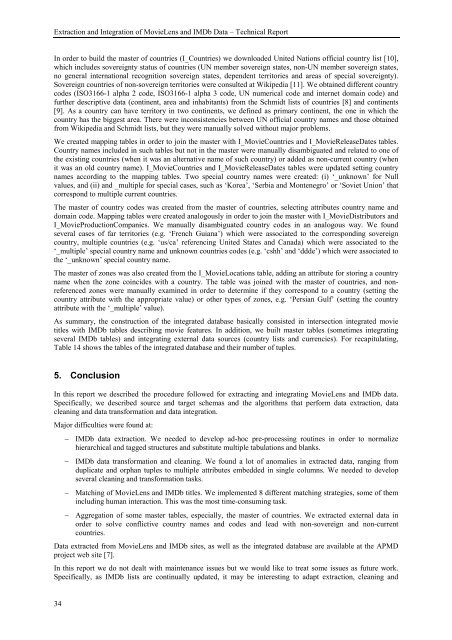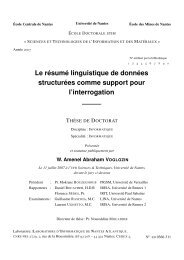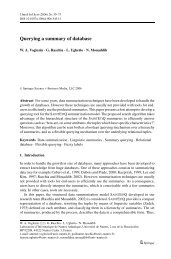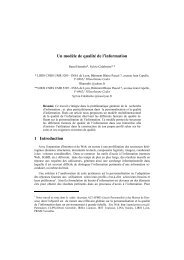Extraction and Integration of MovieLens and IMDb Data - APMD
Extraction and Integration of MovieLens and IMDb Data - APMD
Extraction and Integration of MovieLens and IMDb Data - APMD
Create successful ePaper yourself
Turn your PDF publications into a flip-book with our unique Google optimized e-Paper software.
<strong>Extraction</strong> <strong>and</strong> <strong>Integration</strong> <strong>of</strong> <strong>MovieLens</strong> <strong>and</strong> <strong>IMDb</strong> <strong>Data</strong> – Technical Report<br />
In order to build the master <strong>of</strong> countries (I_Countries) we downloaded United Nations <strong>of</strong>ficial country list [10],<br />
which includes sovereignty status <strong>of</strong> countries (UN member sovereign states, non-UN member sovereign states,<br />
no general international recognition sovereign states, dependent territories <strong>and</strong> areas <strong>of</strong> special sovereignty).<br />
Sovereign countries <strong>of</strong> non-sovereign territories were consulted at Wikipedia [11]. We obtained different country<br />
codes (ISO3166-1 alpha 2 code, ISO3166-1 alpha 3 code, UN numerical code <strong>and</strong> internet domain code) <strong>and</strong><br />
further descriptive data (continent, area <strong>and</strong> inhabitants) from the Schmidt lists <strong>of</strong> countries [8] <strong>and</strong> continents<br />
[9]. As a country can have territory in two continents, we defined as primary continent, the one in which the<br />
country has the biggest area. There were inconsistencies between UN <strong>of</strong>ficial country names <strong>and</strong> those obtained<br />
from Wikipedia <strong>and</strong> Schmidt lists, but they were manually solved without major problems.<br />
We created mapping tables in order to join the master with I_MovieCountries <strong>and</strong> I_MovieReleaseDates tables.<br />
Country names included in such tables but not in the master were manually disambiguated <strong>and</strong> related to one <strong>of</strong><br />
the existing countries (when it was an alternative name <strong>of</strong> such country) or added as non-current country (when<br />
it was an old country name). I_MovieCountries <strong>and</strong> I_MovieReleaseDates tables were updated setting country<br />
names according to the mapping tables. Two special country names were created: (i) ‘_unknown’ for Null<br />
values, <strong>and</strong> (ii) <strong>and</strong> _multiple for special cases, such as ‘Korea’, ‘Serbia <strong>and</strong> Montenegro’ or ‘Soviet Union’ that<br />
correspond to multiple current countries.<br />
The master <strong>of</strong> country codes was created from the master <strong>of</strong> countries, selecting attributes country name <strong>and</strong><br />
domain code. Mapping tables were created analogously in order to join the master with I_MovieDistributors <strong>and</strong><br />
I_MovieProductionCompanies. We manually disambiguated country codes in an analogous way. We found<br />
several cases <strong>of</strong> far territories (e.g. ‘French Guiana’) which were associated to the corresponding sovereign<br />
country, multiple countries (e.g. ‘us/ca’ referencing United States <strong>and</strong> Canada) which were associated to the<br />
‘_multiple’ special country name <strong>and</strong> unknown countries codes (e.g. ‘cshh’ <strong>and</strong> ‘ddde’) which were associated to<br />
the ‘_unknown’ special country name.<br />
The master <strong>of</strong> zones was also created from the I_MovieLocations table, adding an attribute for storing a country<br />
name when the zone coincides with a country. The table was joined with the master <strong>of</strong> countries, <strong>and</strong> nonreferenced<br />
zones were manually examined in order to determine if they correspond to a country (setting the<br />
country attribute with the appropriate value) or other types <strong>of</strong> zones, e.g. ‘Persian Gulf’ (setting the country<br />
attribute with the ‘_multiple’ value).<br />
As summary, the construction <strong>of</strong> the integrated database basically consisted in intersection integrated movie<br />
titles with <strong>IMDb</strong> tables describing movie features. In addition, we built master tables (sometimes integrating<br />
several <strong>IMDb</strong> tables) <strong>and</strong> integrating external data sources (country lists <strong>and</strong> currencies). For recapitulating,<br />
Table 14 shows the tables <strong>of</strong> the integrated database <strong>and</strong> their number <strong>of</strong> tuples.<br />
5. Conclusion<br />
In this report we described the procedure followed for extracting <strong>and</strong> integrating <strong>MovieLens</strong> <strong>and</strong> <strong>IMDb</strong> data.<br />
Specifically, we described source <strong>and</strong> target schemas <strong>and</strong> the algorithms that perform data extraction, data<br />
cleaning <strong>and</strong> data transformation <strong>and</strong> data integration.<br />
Major difficulties were found at:<br />
34<br />
− <strong>IMDb</strong> data extraction. We needed to develop ad-hoc pre-processing routines in order to normalize<br />
hierarchical <strong>and</strong> tagged structures <strong>and</strong> substitute multiple tabulations <strong>and</strong> blanks.<br />
− <strong>IMDb</strong> data transformation <strong>and</strong> cleaning. We found a lot <strong>of</strong> anomalies in extracted data, ranging from<br />
duplicate <strong>and</strong> orphan tuples to multiple attributes embedded in single columns. We needed to develop<br />
several cleaning <strong>and</strong> transformation tasks.<br />
− Matching <strong>of</strong> <strong>MovieLens</strong> <strong>and</strong> <strong>IMDb</strong> titles. We implemented 8 different matching strategies, some <strong>of</strong> them<br />
including human interaction. This was the most time-consuming task.<br />
− Aggregation <strong>of</strong> some master tables, especially, the master <strong>of</strong> countries. We extracted external data in<br />
order to solve conflictive country names <strong>and</strong> codes <strong>and</strong> lead with non-sovereign <strong>and</strong> non-current<br />
countries.<br />
<strong>Data</strong> extracted from <strong>MovieLens</strong> <strong>and</strong> <strong>IMDb</strong> sites, as well as the integrated database are available at the <strong>APMD</strong><br />
project web site [7].<br />
In this report we do not dealt with maintenance issues but we would like to treat some issues as future work.<br />
Specifically, as <strong>IMDb</strong> lists are continually updated, it may be interesting to adapt extraction, cleaning <strong>and</strong>







